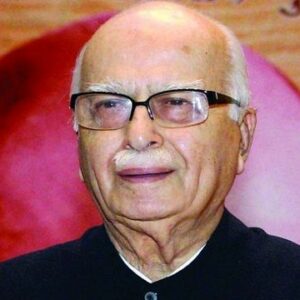Lal Krishna Advani is a politician in India. He was one of the people who started the Bharatiya Janata Party (BJP). He has led the opposition in the Lok Sabha twice and has also been the country’s deputy Prime Minister. He is called the “Iron Man” because he lives up to the values that Sardar Vallabh Bhai Patel stood for. He is a man with strong morals and a lot of intelligence. He is also credited with the rise of the BJP party, which he led with passion and dedication for many years. He was a true patriot who always dreamed of a strong and prosperous India and stayed true to his ideas. People know him for how close he was to the former Prime Minister, Atal Bihari Vajpayee, when he worked as the Minister of Home Affairs. Advani got his start in politics when he joined the Rashtriya Swayamasevak Sangh (RSS) as a volunteer at the age of 14. It didn’t take long for him to realize that politics was his calling, and he spent the rest of his life serving the country. During his career, he has gone on several Rath Yatras. In 1990, he did one to spread the word about the Ram Janmabhoomi-Babri Masjid issue, and in 1997, he did another to celebrate the 50th anniversary of India’s independence.
Early years and childhood
He was born on November 8, 1927, in Karachi, Sindh, to a Hindu family. Kishanchand D. Advani and Gyani Devi were his parents.
He went to Saint Patrick’s High School in Karachi, where he learned most of what he knows now. After that, he went to school at D G National College in Hyderabad, Sindh, Pakistan.
He was interested in politics from a young age. When he was 14, he volunteered for the Rashtriya Swayamasevak Sangh (RSS). When he joined the party, it made him even more committed to politics, and he realized that it was his calling.
L. K. Advani’s Career
In 1944, he became a teacher at Model High School in Karachi. During this time, he also kept up his work with the RSS.
When India was split up in 1947, his life was shattered. In the chaos and violence that followed the partition, he and millions of other people were forced to leave their homes and move to India.
Even though the events of the partition made him very sad, they did not make him angry. Instead, he thought it was his duty to help build a strong, non-religious country, so he kept working in politics.
At the end of 1947, he got more involved in politics. As RSS Secretary, he was in charge of RSS work in Alwar, Bharatpur, Kota, Bundi, and Jhalawar.
He got to know Atal Bihari Vajpayee and moved to Delhi in 1957 to help him. He was the Secretary of the Delhi State Jana Sangh from 1958 to 1963.
In 1960, he became the assistant editor of the Jana Sangh’s political journal Organiser, a job he held until 1967.
He became the head of the Delhi Metropolitan Council in 1967. In 1970, he was elected to the parliament, and in 1972, he became president of the Bharatiya Jana Sangh.
From 1976 to 1982, he represented Gujarat in the Rajya Sabha. In the 1970s, the Jana Sangh was dissolved, and the Bharatiya Janata Party (BJP) was formed. He joined the BJP with his friend Atal Bihari Vajpayee.
Advani became a well-known leader in the newly formed BJP, and in 1980, the party made him its General Secretary. He was in this job until 1986 when he was chosen to be the leader of the BJP.
Under his skillful leadership and direction, the BJP got stronger and stronger until it became a major force in the 1989 parliamentary elections when it won 86 seats, which was a huge improvement from its previous performance when it only won two seats.
He was a Hindu with a secular point of view. In the early 1990s, he led the Ram Janmabhoomi campaign and led the Ram Rath Yatra from Somnath to Ayodhya. The yatra was about the Ram Janmabhoomi-Babri Masjid site in Ayodhya, which is at the center of the Mandir-Masjid dispute.
In 1993, he led the Janadesh Yatra from four different parts of the country. In 1997, to celebrate the 50th anniversary of India’s independence, he started the Swarna Jayanti Rath Yatra.
In 1998, he became Home Minister in the government of Atal Bihari Vajpayee, who had become Prime Minister by that time.
He was the Vice Prime Minister of India from 2002 to 2004.
When the BJP lost the elections in 2004, he became the leader of the other party.
Dr. A.P.J. Abdul Kalam’s autobiography, “My Country, My Life,” came out in 2008. The book went on to become a best-seller and was then published in Hindi, Marathi, Kannada, and Urdu, among other languages.
In the 2009 parliamentary elections, he was supposed to be the party’s candidate for prime minister, but he couldn’t lead the party to victory.
At the moment, he is a member of parliament for the Gandhi Nagar constituency and a mentor to the new BJP leaders.
Personal History and Legacies
The two got married on February 25, 1965. They have a daughter named Pratibha and a son named Jayant.
Estimated Net worth
Unknown.


